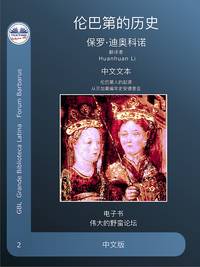
Полная версия
History Of The Lombards
6.
The remaining Lombards chose themselves as King Clefi, of the Belei family, Clefi reigned for two years and then died. The Dukes of the Lombards governed themselves for twelve years, after which they chose as their King Autari, son of Claffone. Autari married Teodolinda, daughter of King Garibaldo, and Walderada of the Bavari. Together with Teodolinda his brother named Gundoaldo came, and the King Autari appointed him Duke of the city of Asta (Este = Asti). Autari reigned for seven years. Acquo (Agilulfo), Duke of Thuringia, left Turin and joined the Queen Teodolinda becoming King of the Lombards.
Agilulfo killed the dukes who opposed him, Zangrolf of Verona, Mimulf of the island of S. Giuliano, Gaidulf of Bergamo and the others who were rebels against him. Aquo (Agilulfo) begat a daughter named Gunperga from Teodolinda and reigned for six years. After him Arioaldo reigned for twelve years. After that, Rotari reigned, of the Arodingi dynasty. He destroyed the cities and fortresses of the Romans that were located along the coast, from the surroundings of Luni to the land of the Franks and east to Oderzo. He fought at the Scultenna river and in that battle eight thousand Romans fell.
7.
Rotari reigned for seventeen years, after him Ariperto reigned for nine years, and then Grimoaldo reigned. At that time the Emperor Constantine left Constantinople and came to the Campania region, then moved to Sicily and was killed by his own. Grimoaldo reigned for nine years and then Pertarito reigned.
HISTORY OF THE LOMBARDS
Paul The Deacon
English text
First book
1.
The northern region, the further away it is from the heat of the sun and cold from the frost of the snow, the more it is healthy for the human body and suitable for spreading bloodlines. On the contrary, the regions located at midday, the closer they are to the sun, the more they are rich in diseases and less suitable for raising mortals. So it happens that many peoples are born under the bear, so that the whole region, from Tanai to the West, even if, in it, the individual localities have their own name, it is commonly called Germany. When the Romans occupied it, they called the two provinces beyond the Rhine, Upper Germany and Lower Germany.
From this populous Germany innumerable prisoners were led away and dispersed, sold as slaves to the southern peoples. But it is true that many bloodlines came out of it, because too many of them do not feed them, and in so doing they afflicted parts of Asia and especially neighbouring Europe. This is evidenced by the cities destroyed throughout Illyria and in Gaul, but above all those of the tried and tested Italy, which experienced the cruelty of almost all those peoples. From Germany came the Vandals, the Rugi, the Eruli, the Turcilingi and other ferocious barbarian populations. In the same way came the lineage of the Winili, or the Lombards, who then happily reigned in Italy. They too are Germanic, although some narrate that they came down from the Scandinavian island.
2.
Pliny Second also speaks of this island in his books On the nature of things. It, as those who visited the year tell us, is not on the sea, but is surrounded by marine waves, these penetrate into the land, favoured by the low level of its coasts. The populations who settled there, very prolific, not being able to live all of them together, are divided, as they say, into three parts, and with the draw they chose who was to leave the land of their fathers.
3.
So that part which fell to the fate of having to abandon the native soil and look for foreign lands, gave two leaders, Ibore and Aione. Two young brothers, flourishing and most vigorous of all. They all said goodbye to their loved ones and the land of their fathers, then set off to find new lands to live in and establish their home. Among them, there was the mother of the two leaders, she had the name Gambara, a keen woman of genius and provident in advising and giving wisdom. In moments of uncertainty, they made no difference to her.
4.
I do not think of moving away from the subject matter, if for a while I invert the order of the narration and I tell, in short, as long as my pen is wandering in Germany, of a prodigy, which is known there to all, besides to something else. In the extreme territories of Germany, to the north east, on the shores of the ocean, under a high cliff, you can see a cavity in which seven men, it is not known for how long, rest dormant in a long sleep, intact not only in the body but also in the guise, precisely because they have resisted without corrupting for so many years, they are the object of veneration, by those uncultivated and barbaric people. They, in clothes, look like Romans. A man pushed by greed wanted to strip one and, as it is said, his arms dried up immediately. This punishment frightened the others, so that no one dared to touch them anymore. You can imagine, why divine Providence keeps them intact for so many seasons, perhaps because one day, since it is believed that they could only be Christians, awakening, with their preaching they will bring salvation to those peoples.
5.
The Scritobini live near this place. This is the name of those people who are not free from snow and fairs even in summer. They feed only on raw meat of wild animals, and from their bristly skins they get what to cover. They derive their name from a word that in their barbaric language means "to jump", in fact they hunt the fairs, running in leaps, on woods curved with a certain art like a bow. A similar animal lives near them to the deer, I myself have seen a dress made with its skin, left bristly with hair as it was on the beast, it was similar to a tunic, knee-length as they use as I have been told. days of the summer solstice, even at night you can see a very clear light and the days are much longer than elsewhere. Conversely, around the winter solstice, although there is daylight, the sun is never seen and the days are very short, more than elsewhere, and longer nights. Moreover, the further you move away from the sun and the lower it is on the horizon and the shadows lengthen. In Italy, as the ancients wrote, on Christmas day , the shadow of the human body measures nine feet, I in the Gaul Belgica, in a place called Villa of Tatone, measuring my shadow I found it nineteen and a half feet. So, on the contrary, the more you are there approaching the sun, going southward the more the shadows become short, to the point that during the summer solstice, when the sun is in the middle of the sky, in Egypt, in Jerusalem and in the neighbouring regions, no shadows are seen. In Arabia, in the same period, the sun is seen over half the sky, towards the north, and consequently the shadows are facing south.
6.
Not very far from the coast we talked about before, to the west, where the ocean stretches endlessly, there is that deep chasm of water that is normally called the "navel of the sea", it is said that twice a day it swallows the waves of the sea, and twice you reject them, as is demonstrated by the rapidity of the tide on those beaches. A similar chasm or vortex is called by the poet Virgil, Charybdis; he places it in the Strait of Sicily and describes it thus:
Occupy the right side Scylla, the left the emplaced Charybdis, and three times from the deep eddy of the abyss swallows the vast waves in its abyss, and again in the air it re-invents them, and flails the stars with the wave.
Of the vortex we mentioned earlier, it is said that it drags ships violently, so quickly as to equal the flight of arrows through the air, so much so that sometimes they get lost in the hideous abyss without escape. Often, however, while they are already being submerged, they are rejected away from the water suddenly and with the same speed with which it sucked them. Another similar vortex is said to be located between the British island and Gaul, this is confirmed by what happens on the beaches of Sequania and Aquitaine. These two times a day are suddenly submerged, so much so that those who are caught a little far from the shoreline can barely escape it. The waters of the rivers of those regions can be seen rising rapidly towards the source for many miles and the sweet waters becoming bitter. The island of Evodia is thirty miles from the beaches of the Sequania but its inhabitants claim to hear the roar of the waters that pour into that of Cariddi. I have heard from a person who enjoys great esteem among the Gauls that many ships, which were overwhelmed by a storm, ended up swallowed by this vortex. Only one of those men who was on those ships escaped there, found himself still floating, unique among his own, dragged by the violent currents towards the precipice, arrived on the edge of that terrible abyss, already dead of fear, he saw that very deep endless chasm, when he had already lost hope, was thrown on a boulder, clung to it. All the water had flowed into the whirlpool leaving the bottom of the sea uncovered, and while he waited anxiously and full of fear for the inevitable end, suddenly, he saw large mountains of water coming, these rose from the bottom; he first saw the ships that had been swallowed up emerge, so when one was near him, he attacked it with all his might. In an instant, quickly, it flew close to the beach, so it escaped the cruel fate and could later tell the danger. Even our sea, the Adriatic, even if in a lesser way, invades the beaches of Venice and Istria, so there is to be thought that there are whirlpools, certainly small and hidden, which swallow and reject the Adriatic waters and of the other Italian seas. After reporting these things, it's time to resume the story.
7.
Under the guidance of Ibore and Aione the Winili left Scandinavia and arrived in a region called Scoringa, where they stayed for a few years. In those times Ambri and Assi, leaders of the Vandals, followed all the neighbouring populations with continuous wars. Emboldened by the many victories, they sent messengers to the Winili with a request for a tribute, giving war as an alternative. So, Ibore and Aione, driven by their mother Gambara, decided that it was better to defend freedom with weapons rather than accept the infamy of paying the tribute. So they sent messengers with the answer to the Vandals, this said they would fight rather than submit. In those times the Winili were all in the prime of their youth but scarce in number, as they were only a third of a people living on an island not very large.
8.
At this point the ancients tell a ridiculous tale. The Vandals went to Godan to ask for the victory over the Winili, but the God replied that he would give the victory to those he had seen first at sunrise. Gambara instead went to Freia, Godan's wife, and asked for the victory for the Winili, the Goddess gave her advice: she said that the women had to untie their hair and adjust it around the face like a beard, then they had to join the men and place themselves with the battle in a place where they were visible from that window from which Godan used to look to the east. So the Winili did and, at sunrise, Godan saw the women dressed like that and not seeing the ingot He did not ask his wife, "Who are those Lungibarbi?" Then Freia asked him to give the victory to those to whom he had just given the name. Thus the God gave the victory to the Winili. These are trivial and ridiculous things, where victory is not the merit of men but given by the gods.
9.
In any case, it is certain that, from that moment, the Winili were called Lombards because of the particularity of their long, never cut beard. Moreover, in their language "lang" means long, and "bard", beard.
Wotan, who changed a letter becomes Gotan, is the same that the Romans call Mercury and is worshiped as God by all the peoples of Germany. It is said that in ancient times this God was not in Germany but in Greece.
10.
So the Winili, also called Longobards, attacked battle, with fury, fighting for the glory of being free, won the victory.
Subsequently, affected by famine in that province called Scoringa, they lost much of their courage.
11.
Emigrating from those regions, while preparing to enter Mauringa, they found the road closed by Assipitti, these were determined not to grant transit to their lands under any conditions. The Lombards, given the large number of enemies and the small number of their army, dared not fight. Deciding what to do, in need, they devised a stratagem, made the enemies believe that they had in their field of Cynocephalic, dog-headed men who fight relentlessly and drink the blood of killed enemies or, in case they cannot grab an enemy, quench their thirst with their own. To give credit to these voices they expand the camp and tents, as well as lighting many fires. The enemies fell into deception and no longer dared to try their luck in the war that they were looking for before.
12.
The Assipitti, however, had among them a warrior considered very strong, and with this very strong champion they wanted to win. They therefore proposed to the Lombards to choose their own champion to compete in a duel with their own. The strict pact was that if the Assopitto warrior had won, the Lombards would have retraced their steps, renouncing to go through those lands, if the Lombard had won they would have had the green light. The Lombards were uncertain on which to choose between them to send against that very strong warrior. Then, a servile condition man offered to fight on behalf of the Lombards on condition that he and all his descendants be removed from the bondage of slavery. What else to say? The Lombards, grateful, accepted and promised to grant him what he asked for. The latter, out of the Lombard ranks, faced the enemy, won, obtained the right of passage for the Lombards and for himself and his loved ones freedom.
13.
Finally arrived in Mauringa, the Lombards decided to remove slavery from many in order to increase the number of fighters. The elevation of these to the status of free men involved a ceremony with the gift of an arrow and the murmuring of an ancient formula in the language of their fathers. After this act they left the Mauringa and entered Golanda where they stopped for some time, it is said indeed, a few years. They occupied Anthab, Banthaib and Vurgundaib, we can believe they are villages or places of little importance.
14.
In the fourth century after Christ.
Dead at the same time Ibore and Aione, who had led the Lombards out of Scandinavia and governed up to this point, not wanting to be submissive only to the Dukes imitating the other Germanic lineages, elected their King. First Agelmondo, son of Aione, reigned his dignity from the Gugingi, a lineage that was the most noble among them. The ancestors handed down that he reigned for thirty-three years.
15.
In those days a harlot, who had given birth to seven babies, a cruel mother more than a beast, threw them into a pond to make them die. If this seems strange, and someone believes it impossible, reread the writings of the ancients where he will find that not only seven, but also nine children were generated at one time, this was typical especially among the Egyptians. The King Agelmondo, passing through that pond, seeing the poor children, stopped the horse and with the spear tried to remove them, one of them reached out and grabbed the rod of the King. Agelmondo, deeply affected, declared that he would become a great and having him removed from the water, he entrusted him to the care of a nurse, also gave orders that he should be bred with every care and since he had been extracted from a pond, which in their language is called "lama", gave him the name Lamissione. Growing up, the Mission became brave and also the most valiant in war, so much so that he became regent at the death of Agelmondo. It is said that one day, while the Lombards were marching with their King, they arrived on the banks of a river, there they found the step blocked by the Amazons. LamissionE threw himself into the river and went to fight with the strongest of them, killed her and gained glory for himself and the passage for the Lombards. In fact, a pact had been established between the two hosts, if the Amazon had beaten Lamissione, the Lombards would have withdrawn from the river, if instead, as happened, Lamissione had won, the Lombards would have had the right to cross the river. However, the chronology of this story seems hardly credible, those who know the stories of the ancients know that the race of the Amazons was exterminated long ago, and that it was located in places other than these. However, considering that the ancient stories were hardly and vaguely and imprecisely preserved, it can be assumed that a part of them continued to exist in those remote wild lands of Germany. Moreover, I have also heard that a tribe of such women still lives in the remote internal regions of Germany.
16.
Crossed the river, the Lombards arrived in new lands and lived there for some time. Since those places were quiet and without suspicion of nasty surprises, they became less attentive and neglected safety, which is always the mother of misfortunes and which brought them not a little misfortune. In fact, at night, while everyone rested relaxed and without any precaution, the Burgundians suddenly fell upon them. Many were wounded and many others killed, as well as King Agelmondo himself, also dragging his only daughter into slavery.
17.
After this defeat they thought about recovering their strength, then the Lombards gave themselves the king of the LamissionE we talked about. The latter, with the ardour of his youth, was ready to compete in war to avenge the death of Agelmondo the one who had raised him. So he turned his arms against the Burgundians, but at the first clash the Lombards turned their s balls to the enemy and took refuge in the camp. Seeing this, the King LamissionE, overwhelming everything with his voice, shouted to his warriors that they remembered the outrage at once, reviewing the shame, how the enemies slaughtered their king, how they had led his daughter into slavery, who they had hoped to see their queen. He urged them to defend themselves and their loved ones with weapons, saying that it is better to die in battle than to endure the ridicule of enemies as worthless slaves. Shouting these things, threatening and making promises, he refreshed the spirits to face the battle, he also said that if he had seen someone of servile condition fight, he would have given him, in addition to the prizes, also freedom. Inflamed by the incitements and by the example of their leader, who before all had launched into the battle, the Lombards burst on the enemies and fighting fiercely, exterminated their opponents by massacring them, so they took the victory over their winners, avenging the death of their own kings and wrongs suffered. From the remains of the killed enemies, they also collected a large loot and this made them more daring in facing the risks of war.
18.
Dead LamissionE who had been the second King of the Lombards, ascended the throne Lethu. He reigned for about forty years, and left the throne to Hildehoc who was the fourth king and upon his death, the fifth was Godehoc.
19.
In those times, between Odoacre, who had reigned in Italy for some years, and Feleteo, called Feba, King of the Rugi, a great enmity originated. At the time Feleteo inhabited the lands beyond the Danube, those which the Danube itself divides from Norico. Also in that area there was the monastery of Blessed Severinus, who lived there in holy abstinence and, at the time, was already worthy of great esteem for his many virtues. And although he had lived in those places until his death, now it is Naples that preserves its miserable little remains. Blessed Severinus had often admonished Feleteo and his wife Gisa to refrain from iniquity, but these, despising his words, did not listen to him, so the blessed foretold them those misfortunes which then struck them. Odoacre therefore, gathered the peoples under his command, Turcilingi, Eruli, part of the Rugi already submitted by him, and also others from Illyria, entered Rugiland, defeated the Rugi, made an almost total massacre and also killed the King Feleteo. Returning to Italy after having devastated the whole region, he brought with him many prisoners leaving those lands almost uninhabited. Then the Lombards, taking advantage of the moment, left their region to occupy Rugiland. In Latin Rugiland means "the ancestral land of the Rugi", this was a very fertile land and here the Lombards lived for several years.
20.
During these events Godehoc died and was succeeded by his son Claffone. Dead also Claffone, who was the seventh, his son Tatone ascended the throne. Also abandoned Rugiland, the Lombards lived in open fields, in the barbarian language called "feld". For three years the Lombards lived in these lands when the war broke out between Tatone and Rodulfo, King of the Eruli. The two sovereigns tried to make a pact of friendship between Eruli and Longobardi but the discord between them ignited. The cause was this, a brother of King Rodulfo had come to offer peace to Tatone, ended the mission, while returning home he happened to pass in front of his daughter's house of the King, Rumetruda, this, intrigued by the large following that preceded him, asked who that man was surrounded by such a noble court, they replied that it was the brother of Rodulfo King of the Eruli, who after having made the embassy to Tatone, he was returning home. Rumetruda sent a messenger to invite him to her, offering him a cup of wine. The latter, with a straight heart as he was, accepted. The girl, seeing that he was of small stature, with the haughtiness born of pride, he humiliated him with mocking words, the nobleman, blazing with shame and at the same time with indignation, replied with words that in the girl caused an even greater disturbance. Rumetruda, lit with feminine fury, unable to hold back the pain in her soul, hastened to perform the misdeed that her irresponsible mind had conceived. She simulated not being offended, with a smiling face and sweet words she coaxed her host, made him sit in a place with a window behind her that she had covered with a precious fabric, as if to honour her guest, in reality she didn't want to suspect him. In the meantime, the ferocious beast had given orders to her servants to take a position behind the window and to the agreed signal, that is when she, addressing the cupbearer, had ordered "petty" to stab him with the spears. And so it happened. As soon as that cruel woman gave the signal, the wicked orders were executed. Rodulfo's brother, pierced by spears, fell to the ground and died.
When Rodulfo was told about the cru of the fate of his brother, he suffered greatly and the desire for revenge ignited in him. Then he broke the bargain pact with Tatone and declared war. What to add to this? The clash took place in the open field. Rodulfo, after deploying his troops for the battle (about 512), certain of the victory, retired to his camp where he played at the board. In those times, the Eruli were trained in war and known to have massacred many peoples. The Eruli fought naked, both for being more agile and for not giving importance to the wounds inflicted by the enemies; so they fought with covered only what needs for modesty. Rodulfo, while playing quietly at the board, ordered a servant to climb a nearby tree to communicate the progress of the victory. Having absolute faith in his, he threatened the servant to have his head cut off if he dared to tell him that the Eruli were running away. The servant, although he soon saw that his King's army was falling back, said nothing, indeed, questioned more and more often by the King, he replied that they fought magnificently. He dared not say anything even when he saw the last ranks of the Eruli turn his back on the enemy, then, even if late, he burst into complaints. "Woe to you miserable Erolia," he said, "that you are struck by the wrath of heaven." At these words the king, troubled, asked: "Could it be that my Eruli are fleeing?" And the servant: "Not me, but you yourself, sir, have said it." Thus, as often happens in these cases, uncertain as to what to do, taken by surprise by the arrival of the Lombards, they were massacred. Even the King, while performing vain acts of heroism, was killed. Meanwhile, the army of the Eruli fled scattered here and there and the anger of the sky struck them, they, seeing the green expanse of the flax plants in the plain, believed them waters that could be crossed by swimming, so they tried to cross them and, while they stretched their arms in vain, they were cruelly struck by the Lombard swords. These, completed the victory, divided the huge loot found in the field of the Eruli. Tatone took the banner of Rodulfo, which they called "ban", and also the helmet that he used to use in war. From that moment, the Etruscans lost importance among the peoples, to the point that they no longer had a King. The Lombards instead, having become richer and greatly increased the army with the submissive peoples, began to seek other wars without being provoked and greatly increased their fame and valour in battle everywhere.








